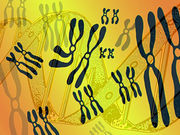Findings may help prevent unnecessary genetic testing of surviving family members
THURSDAY, March 15, 2018 (HealthDay News) — Genetic heart diseases (GHDs) cause fewer cases of sudden infant death syndrome (SIDS) than previously thought, according to a study published in the March 20 issue of the Journal of the American College of Cardiology.
David J. Tester, from the Mayo Clinic in Rochester, Minn., and colleagues conducted whole exome sequencing and targeted analysis of 90 GHD-susceptibility genes in a cohort of 419 unrelated SIDS cases (257 male; average age 2.7 months).
The researchers found that 53 SIDS cases (12.6 percent) had at least one “potentially informative” GHD-associated variant. For mixed-European ancestry cases, the yield was 14.9 percent (21 of 141), and for European ancestry SIDS cases it was 11.5 percent (32 of 278). A potentially informative GHD-associated variant was more likely in infants older than 4 months. When combining all four major cardiac channelopathy genes (KCNQ1, KCNH2, SCN5A, and RYR2), ultra-rare, nonsynonymous variants were significantly overrepresented in European SIDS cases versus European control subjects (P = 0.013). Only 4.3 percent of SIDS cases hosted a “pathogenic” or “likely pathogenic” variant, as defined by guidelines from the American College of Medical Genetics.
“Consistent with previous studies, ultra-rare, nonsynonymous variants within the major cardiac channelopathy-associated genes were overrepresented in SIDS cases in infants of European ethnicity,” the authors write. “These findings have major implications for the investigation of SIDS cases and families.”
Several authors disclosed financial ties to the pharmaceutical and medical device industries.
Editorial (subscription or payment may be required)
Copyright © 2018 HealthDay. All rights reserved.








